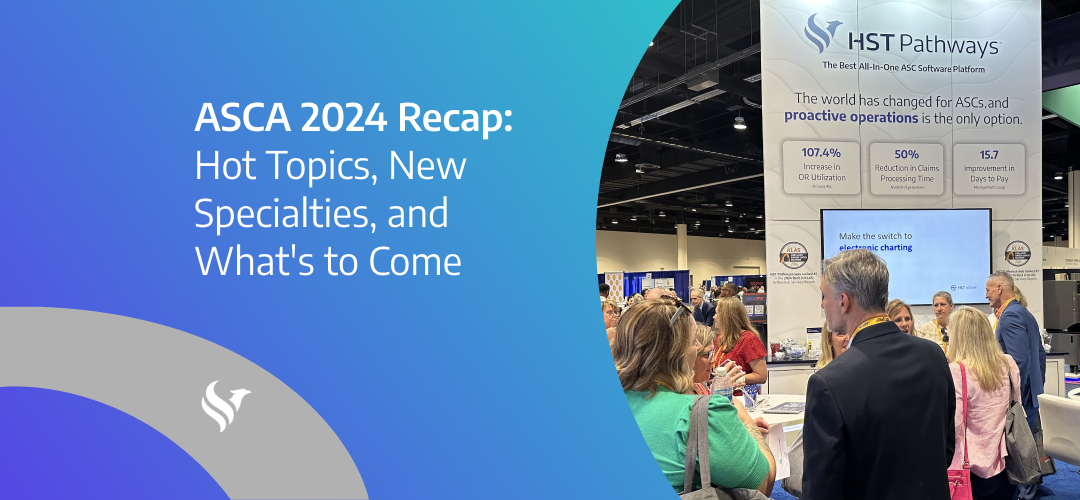ASCA’s Annual Conference, held on April 17-20th in Orlando, FL, brought together experts, professionals, and vendors from the industry to explore the latest advancements and trends in the surgery center industry. With a diverse lineup of renowned speakers and sessions, the conference provided the perfect platform for knowledge sharing, networking, and collaboration.
Here are the key takeaways from ASCA 2024, highlighting the most impactful sessions and shedding light on the emerging trends shaping the industry’s future.
1️⃣ A Growing Interest in Cardiovascular Cases
The shift of cardiovascular cases from inpatient to outpatient settings was a key topic of discussion. Kristen Richards, MBA, Vice President of Cardiovascular Operations at Atlas Healthcare Partners, led a compelling session on the future trends in this area, which also featured prominently in the general sessions. The transition to outpatient care is unique across all states, necessitating some legislative efforts to broaden approvals. While we also await further additions to the ASC Covered Procedures List, more complex procedures are anticipated to move to outpatient settings. Future expansions may include:
- More imaging centers,
- Catheterization labs,
- Virtual cardiac rehabilitation,
- Wearables and other innovations.
One area for improvement is around benchmarking: currently, there are no established benchmarks for cath labs to demonstrate positive outcomes, but data required from HOPDs could serve as a useful interim measure.
2️⃣ ASCs are Batten Down the Hatches When it Comes to Cybersecurity
Every day brings news of another successful cyber-attack on healthcare providers. Recent estimates suggest that 86% of organizations face multiple data breaches within a single year. The recent breach at Change Healthcare underscores the growing vulnerability in the sector. It’s increasingly vital for ASCs to adopt a proactive stance by training staff, securing networks, and fostering a strong security culture to mitigate these risks. For more tips, check out HST’s blog series on cybersecurity best practices: https://www.hstpathways.com/blog/category/cybersecurity/.
3️⃣ Patient Education is Becoming More Important Than Ever
Patients are increasingly taking on the role of informed consumers—they’re asking questions, expecting transparent answers, and seeking active involvement in their care. As competition in healthcare intensifies, offering educational resources and informative videos can significantly enhance trust, comfort, and overall patient satisfaction. For example, sharing detailed information about the following can help demystify the experience:
- Robotic technology (don’t worry, robots aren’t performing surgeries alone!)
- Patient safety protocols
- What to expect on the day of the procedure
- The recovery process
- The difference between an ASC and a hospital
4️⃣ Making Staffing Schedules as Flexible as Possible Can Help With Shortages
The healthcare industry is grappling with significant staffing shortages, and while there’s no one-size-fits-all solution, one widely recommended approach centers on flexibility. Millennials and Gen Z workers are willing to work 36+ hours a week, but they highly value—and sometimes expect—the ability to select shifts that suit their schedules. This sense of control over their time enhances job satisfaction and proves crucial in attracting and retaining these younger employees. Embracing this flexible scheduling approach can help address workforce challenges.
5️⃣ Data-Driven, Proactive Operations is Non-Negotiable
The world has changed for ASCs. With stagnating reimbursements, increasing competition & consolidation, higher acuity cases, staffing shortages, and the rising cost of everything, the most successful and profitable centers are focused on efficient, data-driven, proactive operations. If you have not historically relied on data to make your decisions, start small. Will Evans, HST’s Senior Director of Data Science and Insights, recommends beginning with these KPIs: verification rates, days to bill, and claim denial rate. For even more data & benchmarking, check out the State of the Industry Report: https://www.hstpathways.com/resources/surgery-center-industry-report.
6️⃣ Total Joint Replacements Will Continue to Increase
With more joint procedures being added to the ASC-CPL, incorporating these procedures into your services can be a wise financial decision. Lisa Austin, a healthcare consultant at Avanza Healthcare Strategies, provided valuable insights on developing a successful total joint arthroplasty program at your surgery center. Three critical factors for success include:
- Surgeon Readiness: Ensure your surgeons are well-trained, committed, and motivated, with up-to-date credentials.
- Patient Selection: Carefully assess patient acuity levels, at-home support, and expectations. Consider conducting home evaluations to enhance outcomes and ensure patient safety.
- Reimbursement Strategy: Thoroughly review your charge master, existing contracts, and vendor relationships to optimize financial returns.
Focusing on these areas will help establish a robust program that meets both clinical and business objectives.
7️⃣ ASCA Elected a New Board President, Mark Wainner
ASCA Board members elected Mark Wainner, senior director of ASC Acquisition and Development at Community Health Systems (CHS), as the new board president during the ASCA 2024 Conference. Wainner said, “I am honored to have the opportunity to serve as president of the Ambulatory Surgery Center Association and look forward to continuing to work with our surgery center members, ASCA team members, vendors, affiliates, government entities, legislators, and sponsors to support the mission and goals of the association.”
A huge thank you to ASCA for organizing another wonderful conference on behalf of the industry!
Don’t miss out on the good stuff – Subscribe to HST’s Blog & Podcast!
Every month we’ll email you our newest podcast episodes and articles. No fluff – just helpful content delivered right to your inbox.
